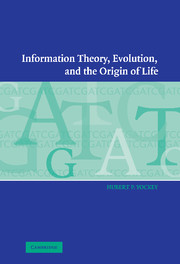Book contents
- Frontmatter
- Contents
- Preface
- 1 The genetic information system
- 2 James Watson, Francis Crick, George Gamow, and the genetic code
- 3 The Central Dogma of molecular biology
- 4 The measure of the information content in the genetic message
- 5 Communication of information from the genome to the proteome
- 6 The information content or complexity of protein families
- 7 Evolution of the genetic code and its modern characteristics
- 8 Haeckel's Urschleim and the role of the Central Dogma in the origin of life
- 9 Philosophical approaches to the origin of life
- 10 The error catastrophe and the hypercycles of Eigen and Schuster
- 11 Randomness, complexity, the unknowable, and the impossible
- 12 Does evolution need an intelligent designer?
- 13 Epilogue
- Mathematical appendix
- Glossary
- References
- Index
- Frontmatter
- Contents
- Preface
- 1 The genetic information system
- 2 James Watson, Francis Crick, George Gamow, and the genetic code
- 3 The Central Dogma of molecular biology
- 4 The measure of the information content in the genetic message
- 5 Communication of information from the genome to the proteome
- 6 The information content or complexity of protein families
- 7 Evolution of the genetic code and its modern characteristics
- 8 Haeckel's Urschleim and the role of the Central Dogma in the origin of life
- 9 Philosophical approaches to the origin of life
- 10 The error catastrophe and the hypercycles of Eigen and Schuster
- 11 Randomness, complexity, the unknowable, and the impossible
- 12 Does evolution need an intelligent designer?
- 13 Epilogue
- Mathematical appendix
- Glossary
- References
- Index
Summary
Although I am fully convinced of the truth of the views given in this volume under the form of an abstract, I by no means expect to convince experienced naturalists whose minds are stocked with a multitude of facts all viewed, during a long course of years, from a point of view directly opposite to mine. It is so easy to hide our ignorance under such expressions as the “plan of creation,” “unity of design,” &c., and to think that we have given an explanation when we only re-state a fact. Any one whose disposition leads him to attach more weight to unexplained difficulties than to the explanation of a certain number of facts will certainly reject the theory. A few naturalists, endowed with much flexibility of mind, and who have already begun to doubt the immutability of species, may be influenced by this volume; but I look with confidence to the future, – to young and rising naturalists who will be to able view both sides of the question with impartiality.
Charles Darwin (1872, p. 444)The Central Dogma and the origin of life “proteins first”
One of the more important contributions in this book, and in two previous papers (Yockey, 2002a, 2002c) is to point out that no code exists to send information from protein sequences to sequences in mRNA or DNA. Therefore, it is impossible that the origin of life was “proteins first” from Haeckel's Urschleim (Section 3.1.1).
- Type
- Chapter
- Information
- Information Theory, Evolution, and the Origin of Life , pp. 182 - 190Publisher: Cambridge University PressPrint publication year: 2005

